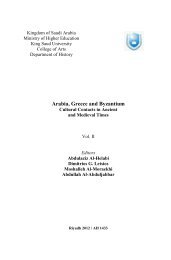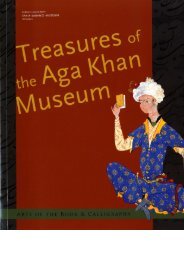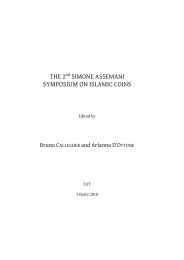ulum-al-quran
ulum-al-quran
ulum-al-quran
Create successful ePaper yourself
Turn your PDF publications into a flip-book with our unique Google optimized e-Paper software.
'If it is beyond your means, fast for three days, that is expiation for the wrath ye have sworn'<br />
(Al-Qur'an 5: 92).<br />
It is free, i.e. left to one's discretion whether to fast three days consecutively or with interruptions.<br />
'And if ye find no water then take yourselves clean sand or earth and rub therewith your<br />
faces and hands' (Al-Qur'an 5: 6). [Some say this aya is 'bound', as the same aya mentioning wudu'<br />
instructs washing of the hands 'to the elbows'; others say it is 'free'.]<br />
'Liter<strong>al</strong>' and 'Understood' Meanings<br />
The meaning of certain ayat is derived from the liter<strong>al</strong> wording (mantdq) while that of others is derived from what is<br />
understood (mafhum) by them:<br />
Of the liter<strong>al</strong> understanding there are sever<strong>al</strong> kinds. The first concerns a clear text, i.e. a text clear and without ambiguity.<br />
'But if he cannot afford it, he should fast three days during the Hajj and seven days on his<br />
return, making ten days in <strong>al</strong>l' (Al-Qur'an 2: 196).<br />
In other cases the text may be somewhat ambiguous in its expression but obvious as far as the meaning is concerned.<br />
'And do not approach them until they are clean' (Al-Qur'an 2: 222).<br />
The Arabic word tatahharna may refer to the end of the woman's menstru<strong>al</strong> period, or the completion of the bath after<br />
the period; the second being more obvious. [Qattan, M.: mabahith It '<strong>ulum</strong> <strong>al</strong>-qur'an, Riyadh. 1971.]<br />
Still other verses imply a meaning through the context, <strong>al</strong>though the wording itself is not clear.<br />
'And out of kindness reward to them the wing of humility' (Al-Qur'an 17: 24).<br />
This applies to parents, and not to <strong>al</strong>l human beings in gener<strong>al</strong>, as the context of this verse suggests.<br />
Al Muqatta'at<br />
The so-c<strong>al</strong>led 'abbreviated letters' are an important section of the mutashabihat' [Itqan, II, p.8f. A summary of the<br />
orient<strong>al</strong>ists' efforts on this topic is in Jeffery. Arthur: The Mystic Letters of the Quran, MW, 14 (1924), pp. 247-60. Some<br />
of the orient<strong>al</strong>ists suggested that the letters are abbreviations of the names of the various Companions who used to write<br />
the Qur'an for Muhammad. Still others say that the letters are simply symbols employed to distinguish the Sura from<br />
others before the now common names were introduced. Sura Ta Ha would be a case in point. This is <strong>al</strong>so based on some<br />
Muslim scholars' views (Itqan, 11, p.10). Watt, the Edinburgh priest-orient<strong>al</strong>ist, writes 'We end where we began; the<br />
letters are mysterious, and have so far baffled interpretation' (Watt, M.: Bell's Introduction to the Qur'an, Edinburgh,<br />
1977, p.64).] in sofar as their meanings are not known. The word is derived from the root 'qata'a' - to cut, and means<br />
'what is cut', and <strong>al</strong>so 'what is abbreviated'.<br />
In technic<strong>al</strong> language the word is used for certain letters found at the beginning of sever<strong>al</strong> suras of the Qur'an, c<strong>al</strong>led 'the<br />
abbreviated letters'.<br />
Their Occurrence<br />
There are fourteen such letters occurring in various combinations at the beginning of 29 suras. The following is a list of<br />
their occurrence and distribution in the Qur'an:<br />
Alif Lam Ra: 10, 11, 12, 14, 15.<br />
Alif Lam Mim: 2, 3, 29, 30, 31, 32.<br />
Alif Lam Mim Ra': 13.<br />
Alif Lam Mim Sad: 7<br />
Ha Mim: 40, 41, 43, 44, 45, 46.<br />
Sad: 38.





